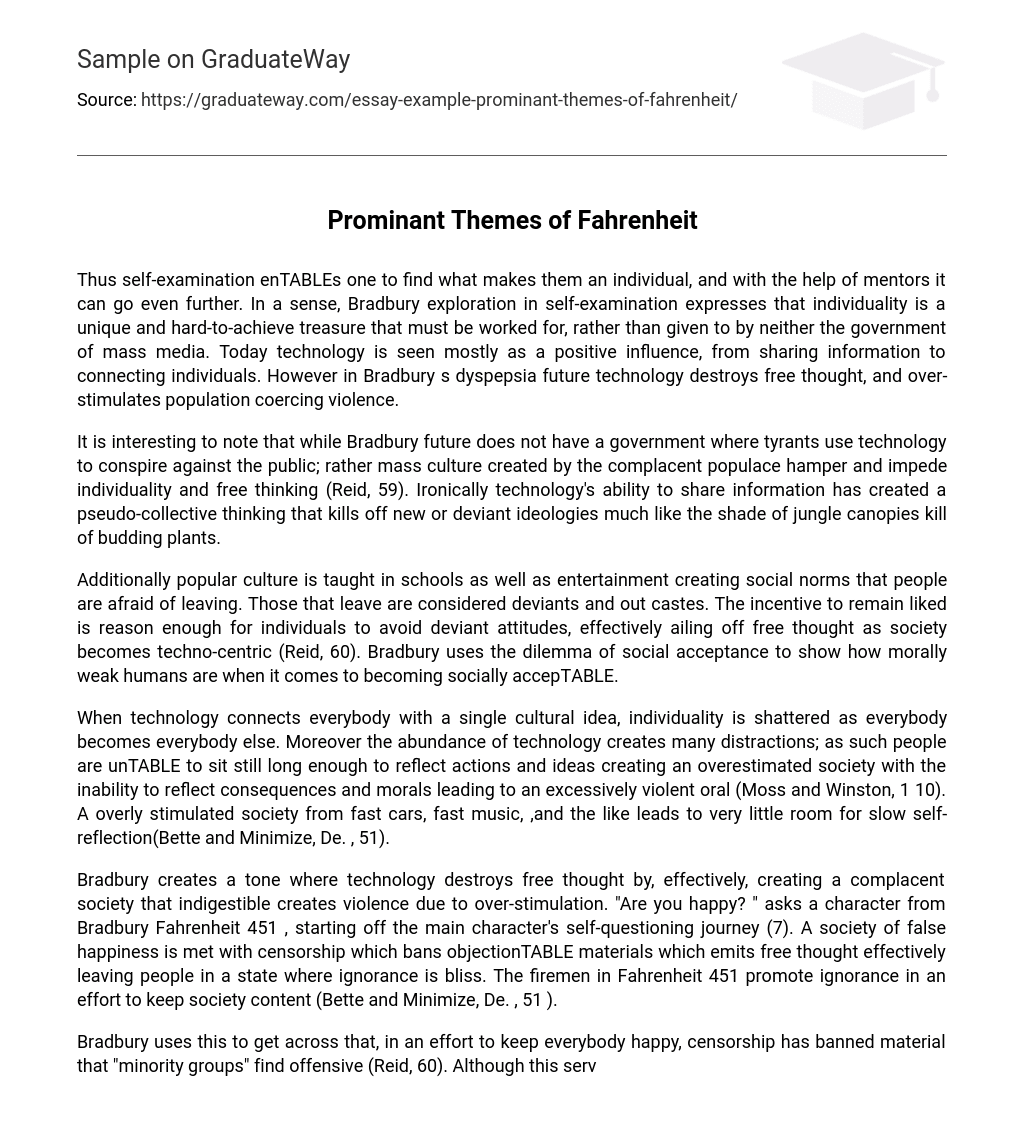Thus self-examination enTABLEs one to find what makes them an individual, and with the help of mentors it can go even further. In a sense, Bradbury exploration in self-examination expresses that individuality is a unique and hard-to-achieve treasure that must be worked for, rather than given to by neither the government of mass media. Today technology is seen mostly as a positive influence, from sharing information to connecting individuals. However in Bradbury s dyspepsia future technology destroys free thought, and over-stimulates population coercing violence.
It is interesting to note that while Bradbury future does not have a government where tyrants use technology to conspire against the public; rather mass culture created by the complacent populace hamper and impede individuality and free thinking (Reid, 59). Ironically technology’s ability to share information has created a pseudo-collective thinking that kills off new or deviant ideologies much like the shade of jungle canopies kill of budding plants.
Additionally popular culture is taught in schools as well as entertainment creating social norms that people are afraid of leaving. Those that leave are considered deviants and out castes. The incentive to remain liked is reason enough for individuals to avoid deviant attitudes, effectively ailing off free thought as society becomes techno-centric (Reid, 60). Bradbury uses the dilemma of social acceptance to show how morally weak humans are when it comes to becoming socially accepTABLE.
When technology connects everybody with a single cultural idea, individuality is shattered as everybody becomes everybody else. Moreover the abundance of technology creates many distractions; as such people are unTABLE to sit still long enough to reflect actions and ideas creating an overestimated society with the inability to reflect consequences and morals leading to an excessively violent oral (Moss and Winston, 1 10). A overly stimulated society from fast cars, fast music, ,and the like leads to very little room for slow self-reflection(Bette and Minimize, De. , 51).
Bradbury creates a tone where technology destroys free thought by, effectively, creating a complacent society that indigestible creates violence due to over-stimulation. “Are you happy? ” asks a character from Bradbury Fahrenheit 451 , starting off the main character’s self-questioning journey (7). A society of false happiness is met with censorship which bans objectionTABLE materials which emits free thought effectively leaving people in a state where ignorance is bliss. The firemen in Fahrenheit 451 promote ignorance in an effort to keep society content (Bette and Minimize, De. , 51 ).
Bradbury uses this to get across that, in an effort to keep everybody happy, censorship has banned material that “minority groups” find offensive (Reid, 60). Although this serves to keep a group from becoming angry it hardly makes them happy, for in what way can denying entertainment to others give anybody happiness. Therefore Bradbury creates a society in a false sense of happiness by making them imply unTABLE to get upset, where in fact Bradbury suggest that by sheltering minds from objectionTABLE material secludes them from any ideas or philosophies that can truly bring one happiness.
In Fahrenheit 451 , the main character shatters the veil of happiness by simply pointing out critical faults with his wife’s friends (Bradbury 41 using character dialogue Bradbury has shown the theme of false happiness by showing the ease in shattering the people’s “happiness. ” The lack of free thought that came about from censorship also disTABLEs the ability for any deviant ideas to cause unhappiness in the general populace, so in fact ignorance is bliss (Bette and Minimize, De. , 50).





